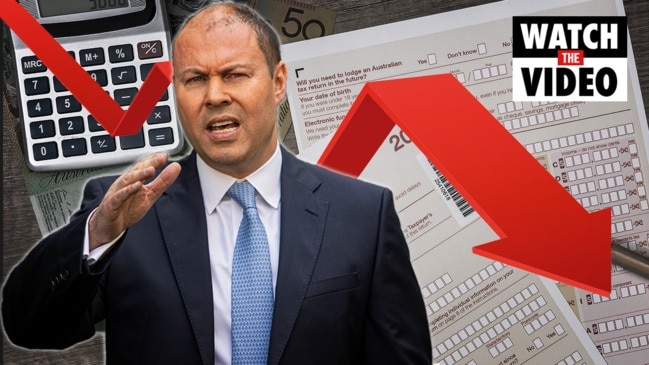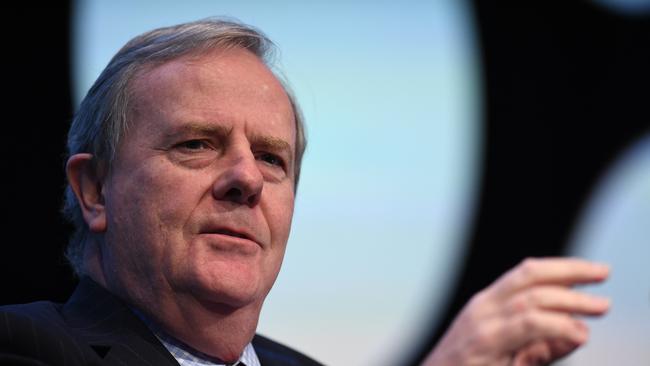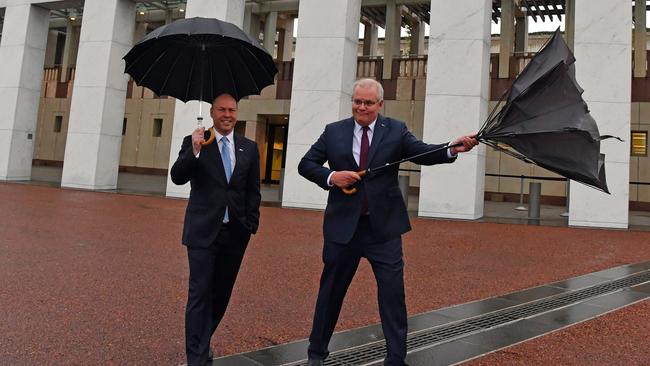Terry McCrann: Budget surpluses have gone forever
No government (or opposition) will ever again be able to claim they will deliver a surplus without the risk of being laughed into utter ridiculousness, writes Terry McCrann.

Terry McCrann
Don't miss out on the headlines from Terry McCrann. Followed categories will be added to My News.
Belated funeral notice and absent epitaph.
The Budget Surplus was formally and quietly buried at 7.30pm Tuesday, October 6, 2020, after its death from a short but devastatingly virulent illness. The Honourable Josh Frydenberg presided in a civil ceremony.
Although the course of the service was quite long and extended, no words, though, were actually said in acknowledgment of the Surplus’s brief life and the ambitions which had been previously held for its future.
It is understood though, that a private family memorial service will be held by its surviving father, former treasurer Peter Costello, where it will be given an appropriate epitaph.

We will never see a federal budget surplus ever again. Costello’s $20bn surplus in 2007-08 – one of only 19 surpluses in the last 50-plus years, 10 of them his – will be the last.
More strikingly and in a way more interestingly, we will never ever again hear a federal treasurer talking about a budget surplus – whether as a fiscal ambition or just as a (fantasy) budget number four or 10 or even 20 years into the future.
This introduces a whole new dynamic into the political and policy debate – because the attainment of a surplus and, very rarely, its maintenance, have been the absolute basis for politics and policy in Australia since the Whitlam days of the mid-1970s.
No Labor Party since then has dared to not promise a budget surplus, or at the very least the ambition of getting into surplus. No Coalition party has missed a chance to claim surplus ownership, even while delivering deficits.
Now, suddenly, pfft, it’s gone. And gone forever. Neither government nor opposition could now dare to claim they would deliver a surplus. They’d be laughed into utter ridiculousness.
This is to say nothing of the sheer stupidity in trying to actually craft policy to aim at getting the budget into surplus.
The punishing spending cuts and massive tax increases that would have to be proposed would be a policy designed to ensure your post-election caucus meetings could be held in a telephone box.
So what becomes the metric now? Only our party can deliver fiscal discipline and good money management; we’ll get the deficit below $50bn?

Hmm. “We’re the party of smaller big deficits and ‘only’ trillion dollar government debt” doesn’t have quite the simplistic but effective punch-through of “ Labor’s the party of debt and deficits; while we deliver surpluses and pay off their debts”.
The central thing to understand about the projections in Tuesday’s budget is that they are the even more than usual the absolute best case numbers – indeed, more accurately, outrageously unrealistic absolute best-case numbers.
Now, budgets always project that the economy will whirr back to good times. They always assume that politicians won’t go on pre-election spending sprees.
And so, they always assume the budget bottom line will at least slash any deficit if not get into surplus.
Wayne Swan’s 2009 budget, at the very depth of the GFC fear and loathing and which had produced the biggest deficit in our history, pre-virus and pre-Frydenberg, predicted the deficit at least would halve by three years into the future.
More recently, budgets have started carrying these always optimistic ‘projections’ – they wouldn’t dare call them ‘forecasts’, far less ‘estimates’ – out as far as 10 years.
So if, like Swan’s 2009 budget, they don’t get back into surplus within the formal four-year budget horizon, they will, they surely will somewhere just ‘over that horizon’ – as Swan’s was supposedly going to do by 2015-16.
Frydenberg’s plays exactly the same optimism game, but with a twist that makes all the numbers super-optimistic.
The ‘twist’ is of course the assumption that we get a vaccine, pervasively applied across Australia before the end of next year – and by implication, that it is applied right across the world as well.

Critically, this doesn’t only play optimistically into the short-term formal budget forecasts – that growth in the economy surges to nearly 5 per cent in 2021-22 and then settles around 3 per cent after that.
And so revenues pick up strongly, from $464bn this year to $526bn in 2023-24, and spending plummets by over $100bn. And so by 2023-24 the deficit is down to ‘only’ $66bn.
It also plays into those longer-term projections, so that the economy keeps whirring seamlessly on through the assumed virus-free 2020s.
This means revenues rising strongly and seamlessly every year through the 2020s; and spending is always under control, with no need for the occasional JobKeeper if the economy had to go into lockdown, because the virus can’t come back.
So, with that seamlessly optimistic backdrop on both the virus and the economy irrespective of the virus, what does the budget project into that golden long-term future?
It projects that in 2030-31 the budget will still be in deficit to the tune of at least $50bn.
This is the first time since Treasury has been doing these utterly ludicrous
10-year ‘projections’ that it has not projected the budget coming into surplus and doing so quite quickly and then staying there.
So even with these, not just optimistic but super-optimistic projections – based on the ‘assume a vaccine’ version of the economist’s ‘assume a can-opener’ joke – we still have big deficits into the 2030s.
Add some cold, hard reality, and you would reasonably conclude that we will be lucky to see a deficit below $100bn anytime soon.
We will certainly never, and I mean, never, see another federal budget surplus.
Originally published as Terry McCrann: Budget surpluses have gone forever

